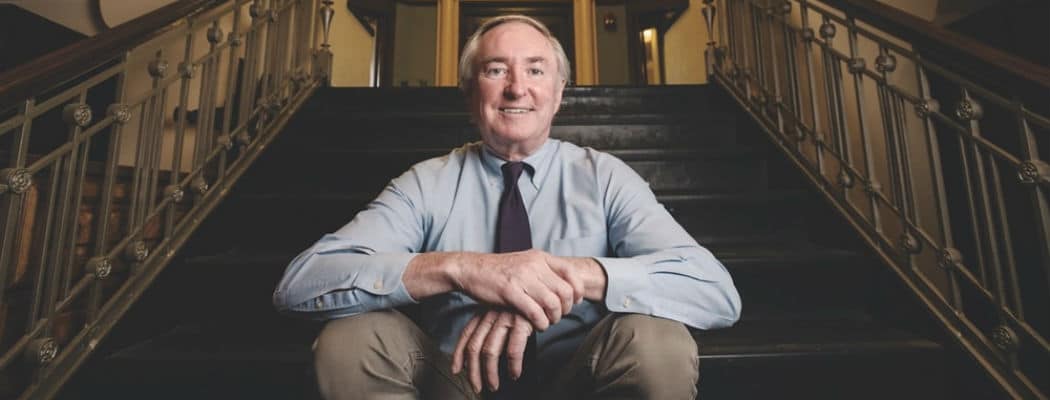The inspiring Dr. Jim O’Connell.
 In the summer of 2005, Jack Welch leaned over and whispered something to Dr. Cary Akins that made the cardiologist’s heart skip a beat. “I want to donate a million dollars to a charity of your choice,” the former chairman of General Electric said. The two Nantucket summer residents were sitting at a table at Topper’s, but only few months earlier, Welch was lying on Akins’s operating table undergoing bypass surgery. He now wanted to thank the doctor for saving his life by making a million-dollar donation in his honor. “Let me give it some thought,” Akins said.
In the summer of 2005, Jack Welch leaned over and whispered something to Dr. Cary Akins that made the cardiologist’s heart skip a beat. “I want to donate a million dollars to a charity of your choice,” the former chairman of General Electric said. The two Nantucket summer residents were sitting at a table at Topper’s, but only few months earlier, Welch was lying on Akins’s operating table undergoing bypass surgery. He now wanted to thank the doctor for saving his life by making a million-dollar donation in his honor. “Let me give it some thought,” Akins said.
The following spring, Welch opened his front door on Beacon Street in Boston to find Dr. Akins huddled under an umbrella with Dr. Jim O’Connell, the president of Boston’s Healthcare for the Homeless Program. The two doctors had met years earlier when Dr. O’Connell was just a medical student, but now Akins considered him to be something of a saint and deserving of Welch’s donation. It didn’t take long for him to make his case. “There was almost a halo around him,” Welch remembers. “If there ever was a saint on earth, it’s Jim O’Connell. He is about the most beautiful, caring individual you’ll ever meet.”
For twenty years, Dr. O’Connell had been caring for patients in homeless shelters, clinics, and on the streets of Boston. Armed with a medical bag, he made house calls to people living under bridges, alleyways, and public parks, forgoing a big medical payday to care for the city’s neediest and forgotten. When he met Jack Welch in 2005, Dr. O’Connell was mounting a capital campaign to transform the former city morgue into a hospital dedicated to caring for the homeless. By the end of their first meeting, Welch was ready to sign over a million-dollar donation to help the doctor make his hospital a reality.
 Today, Boston’s Healthcare for the Homeless Program is a marvel of medical technology that put some of the nearby hospitals to shame when it first opened. It’s considered the gold standard for caring for the homeless. Yet perhaps more impressive than the facility itself is the caliber of caregivers walking its halls. The hospital employs a staff of 485 people, including full-time doctors, nurses, psychiatrists, dentists, and caseworkers. At the head of it all is still Dr. Jim O’Connell.
Today, Boston’s Healthcare for the Homeless Program is a marvel of medical technology that put some of the nearby hospitals to shame when it first opened. It’s considered the gold standard for caring for the homeless. Yet perhaps more impressive than the facility itself is the caliber of caregivers walking its halls. The hospital employs a staff of 485 people, including full-time doctors, nurses, psychiatrists, dentists, and caseworkers. At the head of it all is still Dr. Jim O’Connell.
This June, Dr. O’Connell will be on the island as a featured author at the Nantucket Book Festival where he will be discussing his poignant memoir Stories from the Shadows. While his book provides a rare glimpse into the lives of the homeless, hearing Dr. O’Connell speak brings greater understanding to this most confounding instance of human suffering.
“I had never done anything in homelessness,” Dr. O’Connell says sitting in his office in what was once the city’s morgue. “I remember the initial feeling of being overwhelmed by just how complicated all the medical stuff was.” Dr. O’Connell began treating the homeless at Pine Street Inn in 1985. He had just finished his residency running the ICU at Mass General, and yet he remembers thinking, “This is way more complicated than the ICU.” Compounding the complexities of treating drug-resistant tuberculosis, AIDS, and diabetes with limited resources, Dr. O’Connell needed to gain the trust of his patients.
 “Nothing changes in the life of a homeless person unless you slow down and take the time to earn their trust and develop a lasting relationship,” he remembers the Pine Street Inn nurses telling him. So for the first two months at Pine Street, this high-powered doctor from Mass General did nothing but soak the feet of the homeless and listen to their stories. “Instead of getting discouraged, I just got drawn into the lives of these folks,” he says. “I thought I was only going to do this for a year, but at the end of the year, I wouldn’t dream of leaving.”
“Nothing changes in the life of a homeless person unless you slow down and take the time to earn their trust and develop a lasting relationship,” he remembers the Pine Street Inn nurses telling him. So for the first two months at Pine Street, this high-powered doctor from Mass General did nothing but soak the feet of the homeless and listen to their stories. “Instead of getting discouraged, I just got drawn into the lives of these folks,” he says. “I thought I was only going to do this for a year, but at the end of the year, I wouldn’t dream of leaving.”
To witness the true magic of Dr. O’Connell one must hit the streets with him. Every Friday, he and a team of nurses and psychiatrists make the rounds through Boston, visiting with patients in public parks, train stations, and alleyways. On this particular Friday, Dr. O’Connell’s first “appointment” is with five men and a young woman sitting on park benches.
“Hey Dr. Jim,” one of the men calls out, rising from the bench to greet him. Larry is originally from Mississippi and has known Dr. O’Connell for the better part of twenty years. “I’ll tell you one thing,” he says, after the doctor moves on to his next patient. “That Dr. Jim, he has a good heart on him.”
Next the doctor speaks with a middle-aged man named Sean. From where he’s seated, Sean points to two street corners across the way where he recently lost a close friend and his girlfriend to drug overdoses. “She died on my chest, right there,” he says. “Right there.” Drug addiction and alcoholism are two primary causes of homelessness. Dr. O’Connell and his team work tirelessly to help patients through detox programs. But when the patient finally gets sober, the crushing realities of being homeless can be too much for them to bear and they often relapse. “It’s a vicious cycle,” Dr. O’Connell says.
 After about an hour, Dr. O’Connell and his team continue on to North Station. Along the way, the doctor speaks with a man sitting slumped in an electric wheelchair, his right leg missing. The limb was claimed by successive bouts of frostbite over the course of ten years. “First he lost his toes, then his foot, then his knee,” Dr. O’Connell says. Beyond his amputated limb, the man looks painfully frail and emaciated. His face is weathered and strained. A conservative guess might peg him in his late seventies. “He’s forty-five,” Dr. O’Connell says.
After about an hour, Dr. O’Connell and his team continue on to North Station. Along the way, the doctor speaks with a man sitting slumped in an electric wheelchair, his right leg missing. The limb was claimed by successive bouts of frostbite over the course of ten years. “First he lost his toes, then his foot, then his knee,” Dr. O’Connell says. Beyond his amputated limb, the man looks painfully frail and emaciated. His face is weathered and strained. A conservative guess might peg him in his late seventies. “He’s forty-five,” Dr. O’Connell says.
Outside the Boston Garden, the team finds a young lady, maybe in her mid-twenties, holding a sign in front of a shopping cart full of her belongings. Dr. O’Connell examines a series of swollen injection sights around her neck. In quick order, he discovers that he also treats the young lady’s father, who is homeless due to drug addiction. This spurs a flood of discussion, as the woman hasn’t seen her father in several months.
Watching the interaction illustrates what is perhaps Dr. O’Connell’s greatest gift: his ability to listen. Every minute of this physician’s day is spoken for. His schedule is so busy and demanding that he has a full-time assistant to manage it. Add to the mix a wife and an infant daughter, and Dr. O’Connell’s time is as precious as it comes.
 And yet as the minutes tick by during the course of his discussion with this young woman, he shows not the slightest hint of urgency or impatience. Instead he listens intently and asks questions like a country doctor checking in with a family he’s known for decades. Just as he learned from the very beginning when soaking feet at the Pine Street Inn, the first course of treatment when caring for the homeless is restoring the dignity that every human deserves.
And yet as the minutes tick by during the course of his discussion with this young woman, he shows not the slightest hint of urgency or impatience. Instead he listens intently and asks questions like a country doctor checking in with a family he’s known for decades. Just as he learned from the very beginning when soaking feet at the Pine Street Inn, the first course of treatment when caring for the homeless is restoring the dignity that every human deserves.
“Working on the street puts you in touch with the dark parts of your own life,” O’Connell says, as he finishes his street rounds for the day. “Part of the brokenness you feel inside, you feel in the people outside.” And perhaps through that empathy, doctor and patient both find a way to heal.
As a featured author at the Nantucket Book Festival, Dr. Jim O’Connell will be speaking with N Magazine editor Robert Cocuzzo at 3:30 P.M. on Friday, June 16th in the Dreamland Harborview Room. For more information, click here.





